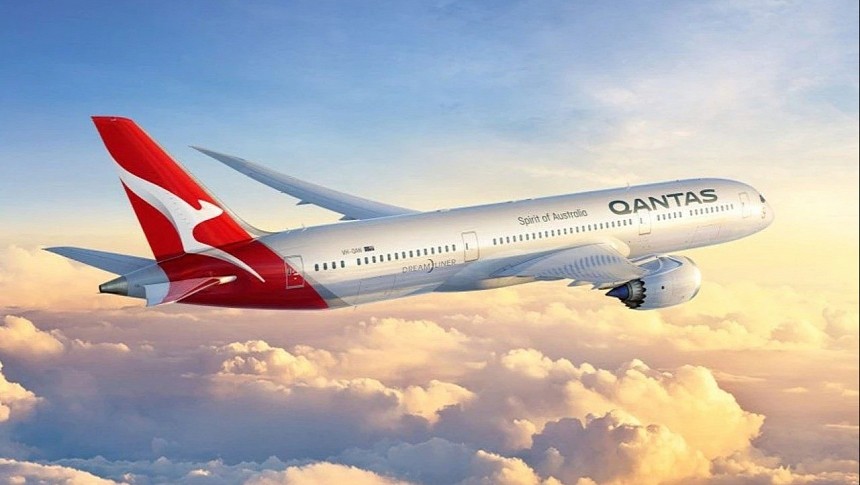Qantas is determined to become an industry trailblazer by operating the world's longest non-stop flight (the highly-anticipated Project Sunrise) and investing heavily in climate-related solutions. The Australian airline is betting on SAF (sustainable aviation fuel) for the net-zero target, and it's introducing the largest fund in the world dedicated to it.
Most operators in the global aviation industry agree that SAF is the best answer for drastically reducing flight emissions as soon as possible. It's sustainable, ready to be used, and, most importantly, it doesn't require any technical modifications to the existing engines or aircraft. Still, there's a catch. The operators who will enjoy wider access to SAF supply will have a clear advantage over those who need to import it.
At the moment, Australia has no domestic SAF market, despite being one of the most prominent supporters of this alternative fuel. Qantas is determined to change this by investing in local industry and lobbying for government support.
Last year, the Aussie airline took a major step in this direction by launching a dedicated SAF partnership with Airbus, worth AUD $290 million ($188 million). This year, it's adding AUD $110 million ($71 million) for a variety of zero-emission solutions, including carbon offsets, technology innovations for increased efficiency, and off-shore SAF production.
The result of this additional investment is the new AUD $400 million ($260 million) Qantas Climate Fund, claiming to be the largest of its kind in the aviation industry worldwide.
Qantas' Climate Fund will be geared toward reaching net zero emissions by 2050. Until then, the operator will work gradually on reducing emission levels, mainly by increasing the percentage of green jet fuel used for regular flights. Having enough SAF to do that is essential for zero emissions, which is why developing a domestic green fuel industry is vital.
Qantas hopes to have 10% SAF in its overall fuel mix by the end of this decade and reach 60% by 2050. At the moment, all of the airline's SAF comes from overseas. Starting this year, ten million liters (2.6 million gallons) of it will be used annually for flights out of London. By 2025, Qantas flights out of California will also be partially powered by SAF, requiring a supply of 20 million liters (5.2 million gallons) per year.
However, Qantas can't single-handedly build a domestic SAF industry from scratch. In places like the US, Japan, and a few European countries, governments are introducing specific regulations, such as a SAF blending mandate, which indirectly encourages production.
Qantas also believes that Australia has tremendous potential when it comes to natural, renewable sources for making alternative fuels, mainly feedstock. Decades from now, it might even become one of the most powerful suppliers in the region and beyond.
At the moment, Australia has no domestic SAF market, despite being one of the most prominent supporters of this alternative fuel. Qantas is determined to change this by investing in local industry and lobbying for government support.
Last year, the Aussie airline took a major step in this direction by launching a dedicated SAF partnership with Airbus, worth AUD $290 million ($188 million). This year, it's adding AUD $110 million ($71 million) for a variety of zero-emission solutions, including carbon offsets, technology innovations for increased efficiency, and off-shore SAF production.
The result of this additional investment is the new AUD $400 million ($260 million) Qantas Climate Fund, claiming to be the largest of its kind in the aviation industry worldwide.
Qantas' Climate Fund will be geared toward reaching net zero emissions by 2050. Until then, the operator will work gradually on reducing emission levels, mainly by increasing the percentage of green jet fuel used for regular flights. Having enough SAF to do that is essential for zero emissions, which is why developing a domestic green fuel industry is vital.
Qantas hopes to have 10% SAF in its overall fuel mix by the end of this decade and reach 60% by 2050. At the moment, all of the airline's SAF comes from overseas. Starting this year, ten million liters (2.6 million gallons) of it will be used annually for flights out of London. By 2025, Qantas flights out of California will also be partially powered by SAF, requiring a supply of 20 million liters (5.2 million gallons) per year.
However, Qantas can't single-handedly build a domestic SAF industry from scratch. In places like the US, Japan, and a few European countries, governments are introducing specific regulations, such as a SAF blending mandate, which indirectly encourages production.
Qantas also believes that Australia has tremendous potential when it comes to natural, renewable sources for making alternative fuels, mainly feedstock. Decades from now, it might even become one of the most powerful suppliers in the region and beyond.







